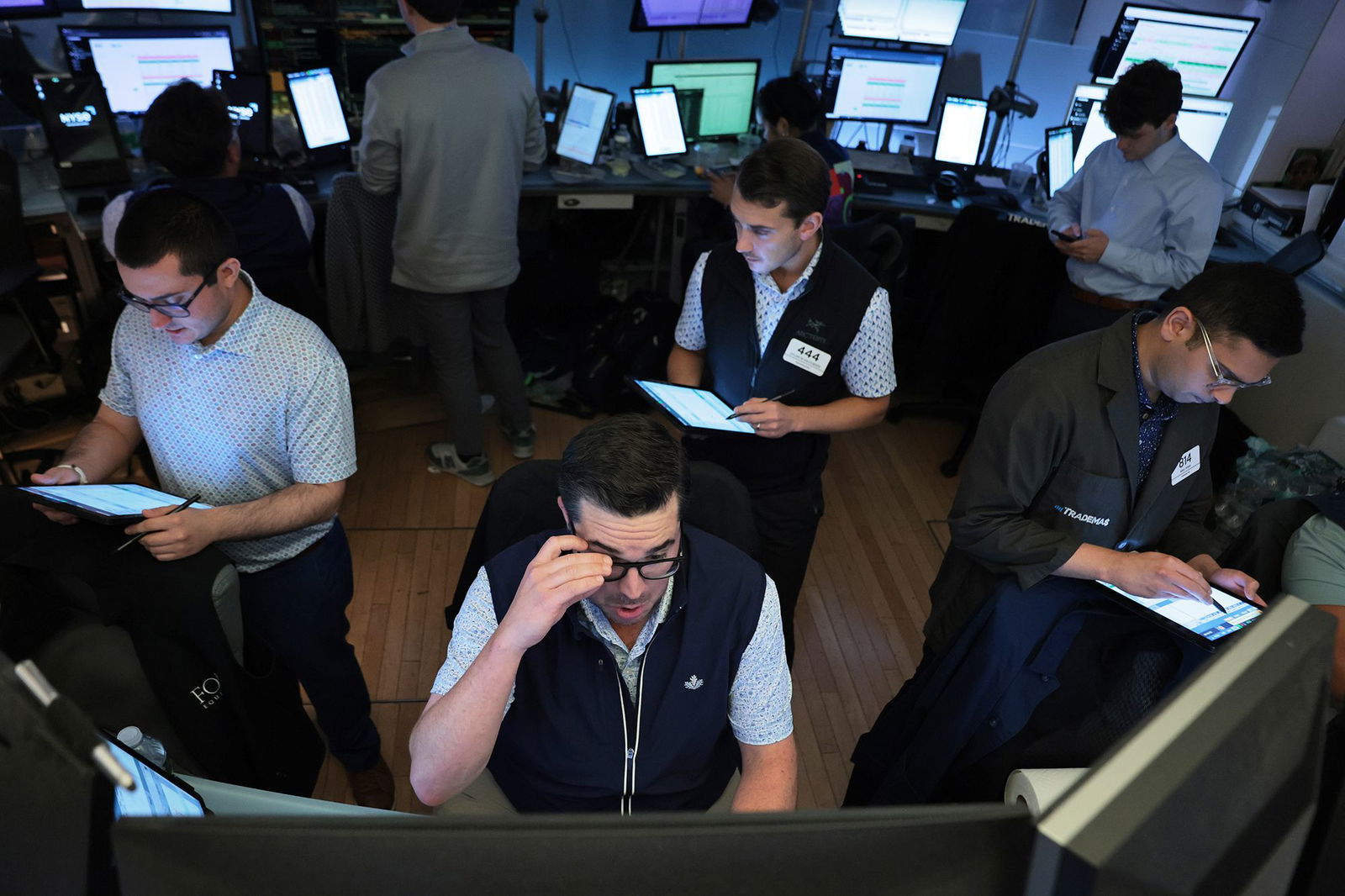Trump is calling Wall Street’s bluff on tariffs

Traders work on the floor of the New York Stock Exchange during afternoon trading on August 1
By John Towfighi, CNN
New York (CNN) — Wall Street traders embraced the term TACO — Trump always chickens out — earlier this year to describe President Donald Trump’s on-again, off-again position on tariffs. Trump liked to impose hefty import taxes but would inevitably back off when markets plunged, analysts said.
Now Trump is calling the market’s bluff.
Yet another round of new tariffs went effect on Thursday, lifting the average tax on US imports to the highest level since the 1930s.
Trump bet markets would absorb this latest news, adapt and move on — and so far he appears to have been right.
Stocks still closed higher on the week, with the Nasdaq hitting a record high on Friday and the S&P 500 notching its best week in over one month.
It’s a remarkable shift from early April, when the president’s “Liberation Day” tariffs caused stocks across the globe to plunge.
But with economists saying tariff effects could take weeks or months to play out, it’s too soon to declare victory just yet.
“He is succeeding in implementing major tariffs without shocking the stock market,” said Ethan Harris, former head of global economics at Bank of America. “It’s surprising, and you could call it an accomplishment if you’re in favor of tariffs.”
Trump may be winning the hand, but Wall Street has lots of cards left. The game isn’t over.
‘Trump always tries again’
Investors in recent months have embraced the “TACO” trade.
A better description would be, “Trump always tries again,” according to Harris.
With the latest import taxes, Trump is pushing forward with an average tariff rate just slightly slower than what he tried to impose on April 2, according to the Budget Lab at Yale.
While stocks are hovering near record highs, Harris said he expects tariffs will inflict “real damage” on the economy, and it remains to be seen if investors will stay complacent.
Carveouts are key
The inclusion of carveouts has softened the blow of tariffs, according to Kurt Reiman, head of fixed income at UBS. That has helped temper investors’ concerns.
Apple (AAPL), for example, is exempt from tariffs on some imports from India and tariffs on semiconductors because of its pledge to develop production in the United States. Apple stock last week soared 13% and had its best week since 2020.
“The tariff wall being built by the administration also has many holes because of numerous product exemptions, carveouts and delayed implementation dates,” Reiman said.
Markets are focused elsewhere
Enthusiasm about the AI boom in the United States is also driving market momentum and drawing attention away from tariffs.
While investors have been concerned about trade, blowout earnings from big tech companies like Nvidia (NVDA) and Meta (META) have helped buoy the market.
In addition, trading partners have largely not retaliated, avoiding a global trade war that would have had worse outcomes for the US economy, according to David Doyle, head of economics at Macquarie.
“What’s really struck me is how little Trump has had to chicken out from,” Robert Armstrong, the Financial Times columnist who coined the term “TACO,” told CNN’s Richard Quest in an August 1 interview.
Wall Street’s fear gauge, the CBOE Volatility index, spiked in early April above 50 points — a historic level not seen since the Covid pandemic or the 2008 financial crisis.
The VIX in August just briefly breached 20 points — a level associated with slightly noticeable volatility — before retreating.
Faith in the ‘Trump put’
Investors are maintaining faith in a “Trump put,” or the notion that if the markets do plummet, the president will refine his approach.
The “Trump put” is different from chickening out, analysts say, as the president might back down just enough to satisfy markets before pushing forward again with his tariffs when he is able to.
“He always tries again until the equity market punishes the policy,” Harris said. “That’s the old ‘Trump put’ idea, which is the way people used to talk about it, and is still the correct way to think about the trade war.”
Stocks versus economy
While Trump has implemented his tariffs, it might be too soon to call victory. Investors are awaiting data on inflation and the labor market in upcoming months to get a better sense of how tariffs are impacting the economy.
“As an investor, you can talk yourself into not worrying about tariffs, but if you’re a company trying to make business plans, you can’t afford to ignore the tariffs,” Harris said. “The stock market and the economy are not the same thing.”
Arun Sai, senior multi-asset strategist at Pictet Asset Management, said investors are taking two leaps of faith in believing in the resilience of the US economy and that “the stagflationary impulse of tariffs” — slower growth and stickier inflation — won’t be as bad as initially feared.
Markets are a “little too complacent,” Sai said, and he will be watching the next two inflation reports ahead of the Federal Reserve’s September policy meeting for any sign of tariff-induced increases in prices.
“By no means are we out of the woods,” Sai said. “ We are priced for nothing to go wrong, and yet we still have a very important inflection point ahead of us.”
The-CNN-Wire
™ & © 2025 Cable News Network, Inc., a Warner Bros. Discovery Company. All rights reserved.



